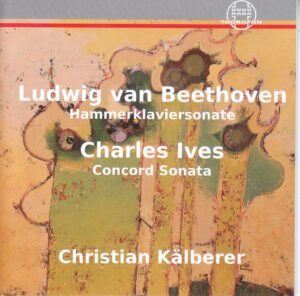It’s admirable when pianists try to honor Beethoven’s seemingly impossible fast metronome marking for the Hammerklavier Sonata’s first movement Allegro. Regarding Artur Schnabel’s sincere yet not totally successful attempt to conquer this pianistic Mount Everest, one writer said that Schnabel gave you less of the notes and more of the music than anyone else. By contrast, Christian Kälberer gives you even less notes and absolutely zero music. He plows through the Allegro like a raging bull pumped up with steroids and then let loose in a china shop. He speeds up at random moments, misses or ghosts notes, drops beats, disregards nearly all phrasing and dynamic directives, and basically burns and crashes his way through the movement. He only slows down a little bit at the development section fughetta’s outset, but not for long.
Kälberer‘s Scherzo seems relatively contained on the surface, but the weird balances and rhythmic instability are giveaways. Kälberer’s briskly perfunctory, arbitrarily phrased Adagio sostenuto answers the question of who can sight-read this movement faster and more insensitively than anyone else while presumably sober. One must credit Kälberer’s well-paced and well-timed Largo fourth movement introduction, but when the Fugue kicks in, all I can say is duck for cover, for here comes the pianistic equivalent of a blind driver joyriding down the highway in an army tank at 200 miles per hour.
Perhaps it’s easier to cloak one’s crude pianism behind Ives’ Concord Sonata’s wild and wooly first two movements. Yet listen to Kälberer’s choppy, stylistically clueless handling of Hawthorne’s hymn-tune quotations, and you’ll realize that he ultimately has nowhere to hide. Even the technically undemanding Alcotts movement moves in fits and starts like a rusty pianola, with scant attention to melodic shape and creating character. At least Kälberer conveys a semblance of line and atmosphere throughout the final Thoreau movement, but only a semblance. Other recordings that I’ve heard made in the Fazioli Concert Hall in Sacile, Italy sound much warmer and fuller bodied than in this dubiously titled release. It goes without saying that Kälberer’s Concord is uncompetitive, while his Hammerklavier now takes its place among classical music’s most notorious “party records.”
































